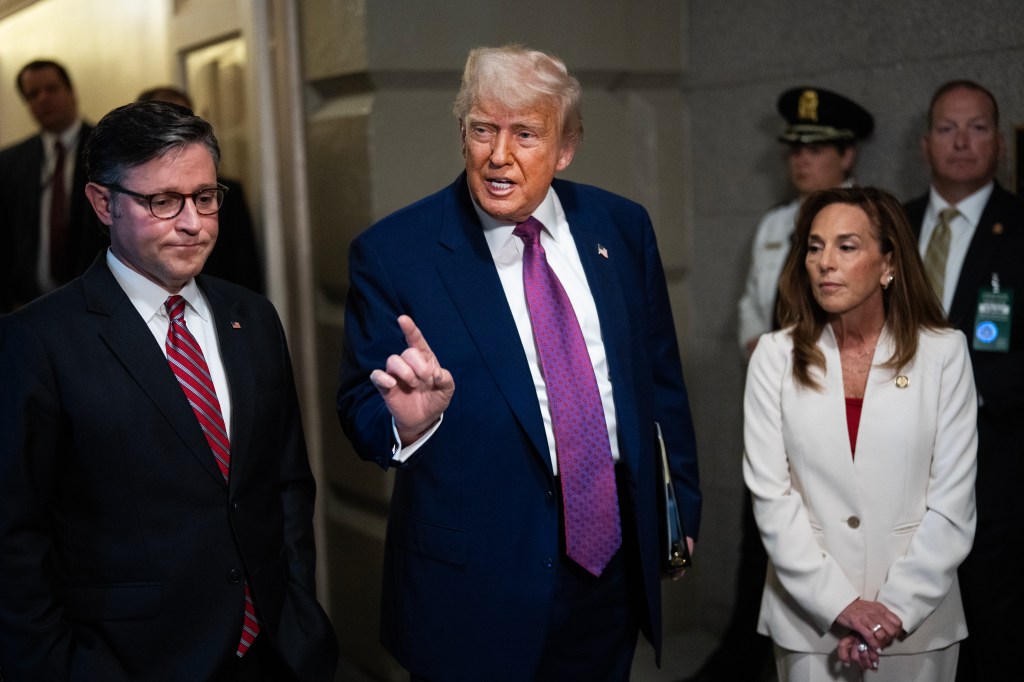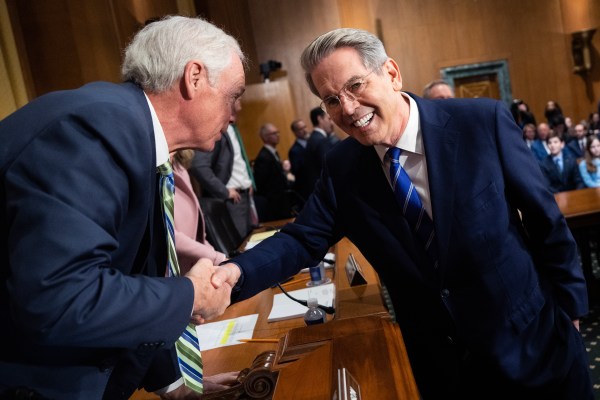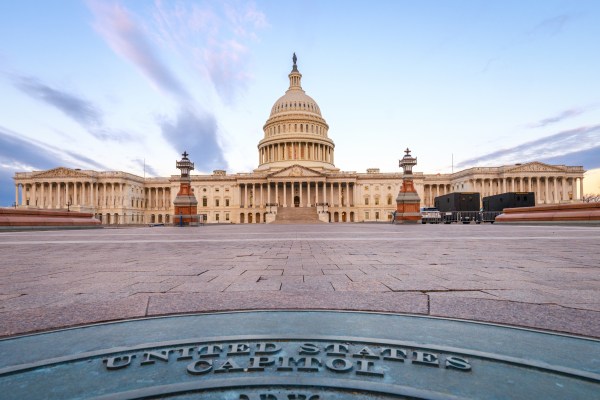Early Thursday morning, House Republicans passed their One Big Beautiful Bill Act containing President Donald Trump’s key legislative priorities for his second term. It took several nights of feverish negotiations between House Speaker Mike Johnson and various factions in the House GOP conference, but the bill is en route to the Senate after passing by a single vote.
As House Republicans worked to craft the bill, reforms to Medicaid proved particularly thorny. In one sense, Republicans’ debates on the topic have showcased the ways in which Trump has remade the GOP in his populist image. But at the same time, some of the intraparty disputes over the bill reflect long-standing divisions.
Republican leaders had argued for both cutting taxes and reforming America’s entitlement programs as recently as during Trump’s first term. Trump, meanwhile, has promised the former but largely rejected the latter. “We are doing absolutely nothing to hurt Medicare, Medicaid, or Social Security. Nothing at all,” he said in late April as the House GOP was writing the portions of its bill that contained its most significant reductions to government spending.
As he attended a meeting with the House conference on Tuesday to press for the bill’s passage, he gave them a starker warning. “Don’t f— around with Medicaid,” he said in the closed-door meeting, according to multiple reports. Republicans had met their targeted $1.5 trillion in spending reductions in the draft of their budget reconciliation bill—which can bypass the Senate filibuster and require only a simple majority—but fiscal hardliners such as those in the House Freedom Caucus sought further changes to Medicaid.
For Sen. Josh Hawley, a populist Republican from Missouri, however, the changes to the health care entitlement for low-income and disabled Americans already had gone too far. Though he affirmed his support for implementing work requirements for certain Medicaid recipients, he balked at the other changes and threatened to vote against the bill, which the Congressional Budget Office estimated would lead to 7.6 million people becoming uninsured. He wrote an op-ed in the New York Times arguing in part that the Republican base will not take kindly to deep cuts to Medicaid. “Our voters support social insurance programs. More than that, our voters depend on those programs,” he wrote.
For him, the Republican Party’s future is tied to representing the working class, which has flocked to Trump and played a crucial role in propelling him to victory.
“They should take Trump’s word for it. What was it he said yesterday?” he told The Dispatch, referencing Trump’s comments to House Republicans. “I think he was pretty explicit in many senses. Listen to the guy who won the popular vote. That would be my advice.”
However, populists are not the only ones arguing against steep Medicaid cuts. A collection of House Republicans in swing districts sent a letter to Johnson and House GOP leaders last month vowing to oppose a bill “that includes any reduction in Medicaid coverage for vulnerable populations.” The dozen lawmakers who signed on—and who eventually voted for the bill—are not hardcore MAGA ideologues. Rep. David Valadao of California voted to impeach Trump following January 6. Freshman Rep. Rob Bresnahan of Pennsylvania defeated longtime incumbent Rep. Matt Cartwright in November by avoiding too many associations with Trump’s wing of the party. Most of all, Rep. Don Bacon of Nebraska has been outspoken against Trump’s populism in favor of a more Reaganite brand of Republicanism, yet he signed the letter as well.
“I believe in free markets, but you’ve got to have a safety net,” Bacon told The Dispatch. “And half of Medicaid goes to children that are sick, so that’s non-negotiable. The other 25 percent is adults with disabilities. These are things that a good country has to have.”
The conflict over Medicaid was not so much between MAGA populists and Reaganites as it was between hardliners who want massive conservative change and an establishment that must deal with political realities. Though Trump has moved the Republican Party in a more populist direction, he has not changed it so much as to completely realign the dynamics that have long existed in the House GOP conference.
Fiscal hawks demanded significant spending reductions while leadership was wary of reforms that would lose the support of more moderate members. This is nothing new: Well before Trump’s ascension, then-Speaker John Boehner clashed with the House Freedom Caucus over spending cuts, disagreements that eventually led to his resignation.
“The Freedom Caucus is made up of a lot of fiscal conservatives,” said Sen. Cynthia Lummis of Wyoming when asked about the parallels between the group’s battles with Boehner and Johnson. Lummis was a founding member of the caucus when she served in the House from 2009-2017. “We all wanted to bend the spending curve much more than other people in the Republican caucus, so nothing about that surprises me. In fact, it is very familiar to me.”
A key difference is that Johnson, unlike Boehner, has a Republican president to back him up. However, the Freedom Caucus’ single-minded focus on cutting spending often puts its members at loggerheads with Trump’s brand of populism, which, though it may give lip service to reducing government overspending on the margins through the Department of Government Efficiency, is not committed to serious deficit reduction.
In hindsight, there was a precursor to this conflict in the interregnum between Election Day and Trump’s second inauguration. Just before Christmas, a funding deadline led to a scramble to avert a government shutdown. The original bipartisan stopgap spending measure failed because it contained several provisions unrelated to keeping the government open. After that deal fell through, the incoming Trump administration asked Congress at the last minute not only to continue government funding but also to raise the debt ceiling to avoid a legislative battle with Democrats this summer (which may still happen regardless). As expected, spending hawks objected to increasing the debt limit without spending cuts, and about three dozen Republicans voted with Democrats to reject the stopgap bill. To resolve the conflict and keep the government open, Johnson had to make a deal with House Democrats that did not include the debt ceiling provision. He would end up surviving that battle, though not without encountering a slight bump in the road in his bid to retain the speakership early in the year.
That saga raised questions about how strong Trump’s hold on the party was—and how well he would be able to impose his will on a quarrelsome and slim GOP House majority. But now that Trump has successfully whipped Republican votes for both the budget resolution and the final reconciliation bill, his grip appears tighter than ever. The Freedom Caucus got some concessions, but eventually fell in line behind the president.
When lawmakers return from their Memorial Day recess, the Senate will have its chance to argue over the bill, and its members are already demanding changes. Hawley wants to adjust many of the Medicaid provisions, while Sen. Ron Johnson of Wisconsin has called for a return to pre-pandemic spending levels. The next month will show whether Trump can convince Senate skeptics to get to “yes” as well.
“Now the Senate has to grapple with its own fiscal conservatives because the House bill is still spending too much money,” Lummis told The Dispatch. “So there will be now similar dialogues with Senate fiscal conservatives.”










Please note that we at The Dispatch hold ourselves, our work, and our commenters to a higher standard than other places on the internet. We welcome comments that foster genuine debate or discussion—including comments critical of us or our work—but responses that include ad hominem attacks on fellow Dispatch members or are intended to stoke fear and anger may be moderated.
With your membership, you only have the ability to comment on The Morning Dispatch articles. Consider upgrading to join the conversation everywhere.